The electrification of buses in public transport fleets is gaining more and more attention worldwide. Both, in China and Germany, there are several government programs, pilot projects and R&D activities taking place with the aim to replace conventional buses with electric buses in the most economical and environmentally friendly way. Drivers for electrification of public buses are diverse: The necessary reduction of energy consumption and greenhouse gas emissions in light of depleting natural resources and climate change; the reduction of air pollutants and noise ascribed to road transport; and the growing availability of market-ready technologies like high-capacity traction batteries, fast-chargers and ultracaps.
Accelerating fleet renewal: A new policy by the Chinese Government
In November 2015 the Chinese Ministry of Transport, the Ministry of Finance and the Ministry of Industry and Information Technology jointly released a new regulation, which obligates local governments and relevant stakeholders to promote the integration of electric buses in public transport fleets. In this context, the share of new energy buses in public transport is targeted to rise to 30%, 60% and 80% until 2019 regarding specific provinces or cities. In Beijing, for instance, a share of 80% in 2019 is anticipated. According to the regulation, new energy buses deployed have to comply with energy efficiency and new energy vehicle standards.
In addition, the Chinese government is supporting the procurement of electric buses through charging infrastructure development and numerous subsidies. In 2016, the purchase of a BEV bus with a minimum range of 250km, a relatively high weight specific energy consumption of less than 0.25Wh/km, and a bus length of 10m to 12m can be subsidized with up to 500,000 CNY (Table 1).
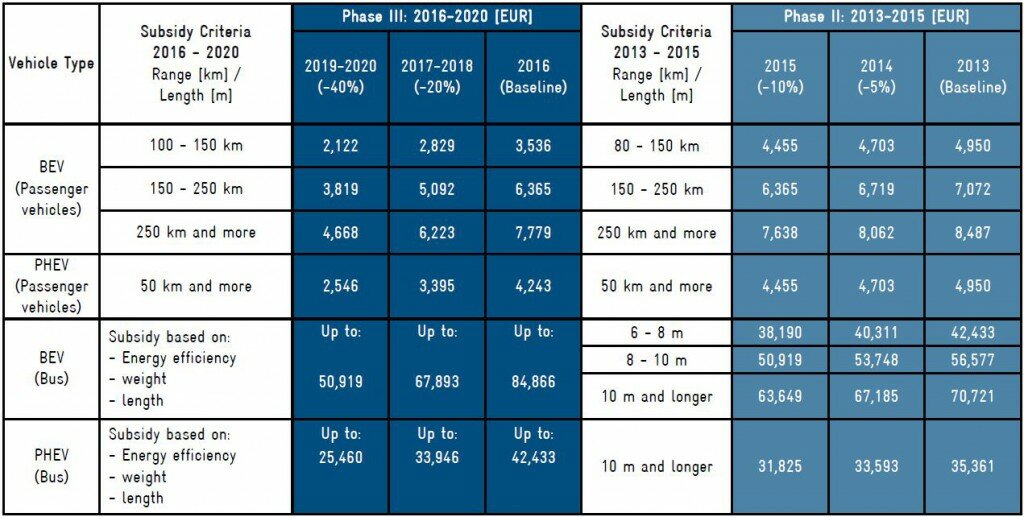
An important aspect of the regulation is the introduction of a reporting system. The reporting system requires local authorities and public transport companies to submit relevant data on the status of electric buses in the local public transport sector. It will not only serve as a tool for monitoring the progress of electric bus deployment but also for identifying additional policy measures required to further promote the integration of electric buses in public transportation.
International cooperation to facilitate knowledge exchange
Technological options for drive systems and charging infrastructure, barriers for their implementation and current pilot projects were discussed during the Sino-German Workshop “Electric Buses – Application and Evaluation”, which took place in Beijing on 20th November 2015 organised by the Research Institute of Highway and GIZ, funded through the German Federal Ministry for the Environment (BMUB). Speakers included experts from the Institute for Energy and Environment (IFEU), a German non-profit environmental institute, researchers from Beijing University of Technology and Beijing University of Aeronautics and Aviation, and experts from Shandong Qingdao Power Supply Company and electric bus and traction battery manufacturer BYD.
The status of electric bus development in China and Germany
Prof. Chen Yanan from Beijing University of Technology outlined during her presentation, that the Beijing municipal government is already actively promoting new energy buses. It issued the Clean Action Plan 2014, which aimed at increasing the share of new energy vehicles to 65 % of the total bus fleet. With the new regulations described above Beijing is to even further increase the share to reach 80% by 2019. During the next couple of years the number of electric buses is expected to rise from 900 to 4500. By 2017 200.000 new energy vehicles are planned to be on Beijing’s roads which is expected to result in significant reduction of energy consumption and air pollution. Subsidies by the government for electric bus purchases in Beijing are already put in place and support transport companies in replacing their conventional buses with electric buses. However, underlying conditions for bus operations in general need to be conducive, in order to successfully reach the set targets. For example, service routes in Beijing are currently too long given the lack of charging infrastructure and inconvenient slow charging approach. Therefore, widely distributed fast charging poles are needed along with more parking space and highway service areas.
Safety monitoring and coordinated management among the various stakeholders are of great importance, as emphasized during the presentation from Mr. Fan Yongzhai from Shandong Qingdao Power Supply Company. The company operates a battery swapping station demonstration project for electric buses in Xuejiadao which equips buses with data collection modules. These modules store data on fleet track, cells, local temperature, and charging process monitoring, which enables monitoring of safety conditions and application of control mechanisms.
So far, the batteries used in the swapping station showcased surprisingly good performance, not exceeding 20% degradation after 4.5 years of use. In the coming 5th year of operation the battery degradation process will undergo further analysis. Since recycling is not an envisaged option for the end-of-life batteries, usually left with 80% of their capacity, alternative options for the reuse of batteries is targeted and still needs further research.
Another important aspect of swapping stations is the high upfront investment required. Therefore, further options for reducing cost need to be explored.
In Germany, many policies and programs targeting the promotion of electromobility have been developed since the “National Strategy Conference on Electric Mobility” in 2008. In this context, the German government is also supporting different projects and programs on electromobility, for example within the National Climate Protection Initiative .These pilot projects enable a close cooperation between industry, science, and central government and allow for testing and evaluation of different elements of electromobility. Some projects and subsidy programs specifically target electric buses. Alongside state funded electric bus programs a variety of further, privately funded electric bus programs exist. The electric bus projects in Germany mainly focus on issues such as:
- Feasibility studies for everyday use in public transport
- Optimization of charging strategies
- Optimization of route characteristics
- Inductive charging and fast charging
Evaluation of pilot projects in Germany
In average, the 111 hybrid buses operated in German pilot projects in 2013-2014 showcased an availability of 82%. In comparison, the availability of the four electric buses operated was 66.7%. The main reason for loss of operation time for hybrid buses was due to defects that were not related to the hybrid technology. In contrast, loss of operation time due to defects related to the electric vehicle technology represented the main reason for reduced availability of electric buses. In this regard, the electric vehicle technology seems to be more prone to defects. However, the small quantity of electric buses operated stresses one-time incidents. For example, two of the four electric buses had an availability of about 80%. Thus, further analysis with a higher number of electric buses operated is needed.
Comparing total costs of hybrid buses and diesel reference buses, investment in and maintenance of hybrid buses is still higher, while costs related to fuel consumption decreased and is below diesel bus fuel consumption costs. However, over the next years all electric bus systems will be subject to cost reduction, narrowing the economic gap between conventional buses and electric bus systems.
All in all, electric bus technologies provide specific opportunities and risks depending on individual conditions (acceptance, operating strategy, etc.). Therefore, evaluation of electric bus technology for public transport still requires further case specific analysis.
[PPT] Introduction to Bus Electro-Mobility Development in Germany – ifeu_20.11.2015_EN
[PPT] 公交车充换电站运营-中德交流会_14.12.2015_CN
[PPT] 公交发展路径及能耗研究 The Development Planning and Energy Consumption Research of New-energy Transit_14.12.2015_CN/EN
[PPT] 比亚迪——新能源公交车推广应用情况与经验交流 BYD Pure Electric Bus Popularization ,Application and Experience exchange_14.12.2015_CN/EN
[PPT] 新能源汽车能耗与排放分析 Life cycle energy and emissions for electric vehicles_20.11.2015_CN/EN
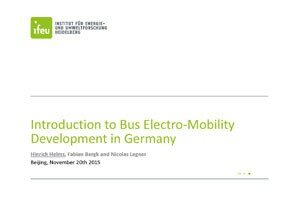
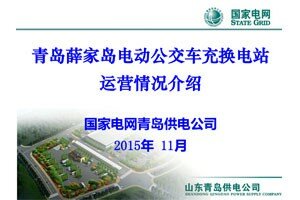

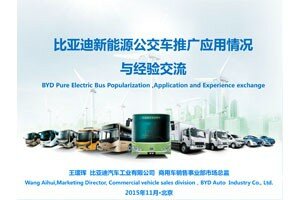
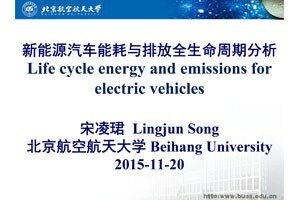



Comments are closed.